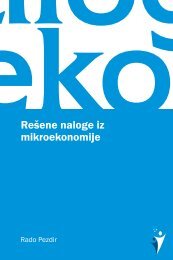Full Text - International School for Social and Business Studies
Full Text - International School for Social and Business Studies
Full Text - International School for Social and Business Studies
You also want an ePaper? Increase the reach of your titles
YUMPU automatically turns print PDFs into web optimized ePapers that Google loves.
3. ANALYTICAL METHODS AND RESULTS<br />
The author used a combination of qualitative <strong>and</strong> quantitative research method, through which<br />
the advantages of both approaches became available. By the results of the research project it<br />
can be shown that differences between Hungary <strong>and</strong> the countries of the German-speaking<br />
culture are considerable. These differences arise primarily from the different norms <strong>and</strong><br />
values, actions <strong>and</strong> behaviors that have their roots in the history of the country. The research<br />
results also show that to be successful everyday cross-cultural cooperation should be<br />
considered despite the daily difficulties in an intercultural working environment. Empirical<br />
studies have shown that cultural differences are affecting communication <strong>and</strong> decisionmaking<br />
<strong>and</strong> can cause conflicts. The conducted empirical studies do not allow generalized<br />
statements. There is a clear need <strong>for</strong> further investigations. In comparison to the initial<br />
conceptual framework of the research project is striking that out of the non-operational<br />
framework conditions the legal-political <strong>and</strong> socio-cultural framework conditions have very<br />
high relevance. The importance of the economic environment is getting more into the<br />
<strong>for</strong>eground. The final part of the paper summarizes the key findings of the research project. In<br />
particular, the operational framework of the business processes <strong>and</strong> multilingualism is<br />
important. They have a direct impact on intercultural communication. Company size is a more<br />
basic condition, which affects the internal cross-cultural communication. As the study is<br />
associated with the human conditions of the norms <strong>and</strong> values, professional competence <strong>and</strong><br />
language skills, the leadership <strong>and</strong> behaviors are highly relevant. Age dependence is also an<br />
important aspect when considering the cross-cultural communication. Of the indirect action<br />
parameters, as it has been proven many times already in the literature by empirical studies the<br />
leadership <strong>and</strong> corporate culture play an important role in intercultural communication. Last<br />
but not least a clear corporate structure defined <strong>for</strong> successful intercultural communication is a<br />
must. The intercultural communication itself <strong>and</strong> the in<strong>for</strong>mal contacts contribute mainly to<br />
the success of intercultural cooperation. The instruments of intercultural human resource<br />
development, the <strong>for</strong>mal working relationships <strong>and</strong> an active, integrated system of incentives<br />
<strong>for</strong>m the basis of a sustainable <strong>and</strong> successful intercultural cooperation. Among the<br />
instruments of cross-cultural human resources development are mainly the training measures.<br />
The result can only have the desired effects in a well-designed, structured <strong>and</strong> continuous<br />
<strong>for</strong>m, with feedbacks. The in<strong>for</strong>mal working relationships must be clearly defined. An<br />
integrated system of incentives should promote the goal of the company goals <strong>and</strong> values of<br />
corporate culture by supporting certain actions <strong>and</strong> behaviors <strong>and</strong> highlights. Also, <strong>for</strong>mal <strong>and</strong><br />
in<strong>for</strong>mal meetings <strong>and</strong> events can help promote a smoother intercultural communication. The<br />
degree of interaction is of great importance in the success of a cross-cultural cooperation.<br />
Among the degrees of the interaction are mainly included the frequency, intensity <strong>and</strong> the<br />
level of relations.<br />
The results of the qualitative part of the research have indicated that the smallest differences<br />
<strong>and</strong> thus probably also the least culturally based conflicts are those between Austrians <strong>and</strong><br />
Hungarians. This assumption could be confirmed neither by the qualitative nor by quantitative<br />
research. From the interviews resulting potential areas <strong>for</strong> improvement are congruent with<br />
those of the online survey.<br />
The qualitative empirical study yielded in<strong>for</strong>mation on the topic of cross-cultural<br />
communication within companies that come from German-speaking countries <strong>and</strong> are active<br />
in the study was based on an online questionnaire. The results of empirical studies brought<br />
findings that are summarized in this section. Significant cultural differences are reflected in<br />
the daily cooperation between the Germans, Austrians, Swiss’ <strong>and</strong> the Hungarians. The<br />
770








